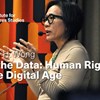dignity

Lea Ypi: Can beauty save the world? On historical injustice, reconciliation and aesthetic education
'Beautiful world! Where hast thou gone?" asks Friedrich Schiller in his famous poem The Gods of Greece. He laments the loss of harmony in a world divided by injustice both past and present. In this le
Completed: Dilemmas of democratic self-defense in European public broadcasting
This project examines how public broadcasting organizations have responded to the growing presence of broadly defined populist and extremist parties.
Rawlsian Constructivism and the Assumption of Disunity
Journal of Political Philosophy, 27/1 (2019): 48–66. DOI: 10.1111/jopp.12157 Read the article: Rawlsian Constructivism and the Assumption of Disunity
AI4People or People4AI? On human adaptation to AI at work
Ai & Society. Curmudgeon paper Abstract There is a disturbing discrepancy between the AI ethics frameworks that highlight the technology’s ability to promote the social good and the relationship bet
Public broadcasting and democracy’s defense: responses to far-right parties in Germany and Sweden
Democratization, vol 30, issue 6 Abstract This article studies the response by public sphere institutions in democratic societies to far-right parties, focusing specifically on public broadcasting organ
Why Inflicting Disability is Wrong: The Mere Difference View and The Causation Based Objection
I The Oxford Handbook of Philosophy and Disability, Adam Cureton and David Wasserman (eds). Oxford: Oxford University Press (2020) Abstract This Handbook introduces philosophers, as well as other scholars
Wendy H. Wong: We, the Data: Human Rights in the Digital Age
Venue: Institutet för framtidsstudier, Holländargatan 13, 4th floor, Stockholm, or online. Research seminar with Wendy H. Wong, Professor of Political Science and Principal's Research Chair at the UniveThis talk will discuss some of the key themes from We, the Data: Human Rights in the Digital Age, which is a new book published by MIT Press. Human rights are one of the major political innovations of the 20th century. Their emergence after World War II and global uptake promised a new world in which human autonomy, community, dignity, and equality could be protected. Datafication, however, poses some unique challenges for our human rights framework because they are “sticky” and ubiquitous in emerging technologies such as artificial intelligence (AI). The talk focuses on five takeaways from the book that ties AI and data to human rights.

Wendy H. Wong: We, the Data - Human Rights in the Digital Age
Research seminar with Wendy H. Wong, Professor of Political Science and Principal's Research Chair at the University of British Columbia. In this talk Wendy H. Wong discusses some of the key themes fr
Indignity: A conversation with Lea Ypi
Venue:Institute for Futures Studies, Holländargatan 13 in StockholmNote that this seminar will not be broadcasted, but recorded. REGISTER > Join us as we welcome back Lea Ypi, professor and award-win. In this memoir, Ypi tells the story ofgrowing up in Albania during the rule and collapse of communism.
The impact of AI on the future of work
There is no denying that Artificial Intelligence (AI) will change the world of work. In the report "The Future of Work: Augmentation or Stunting?" philosopher Karim Jebari and Markus Furendal, a polit








